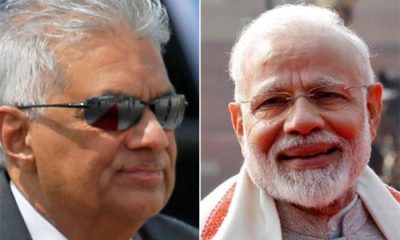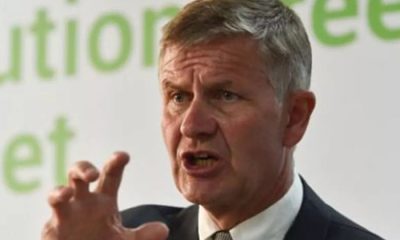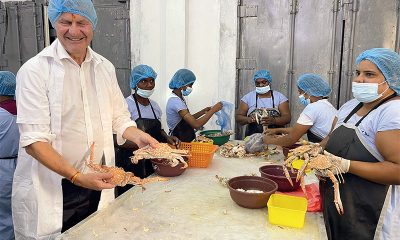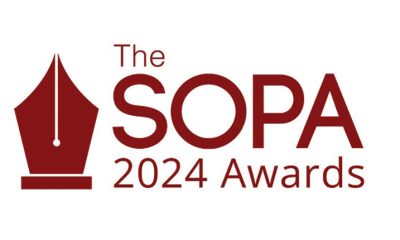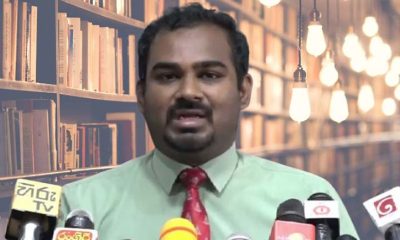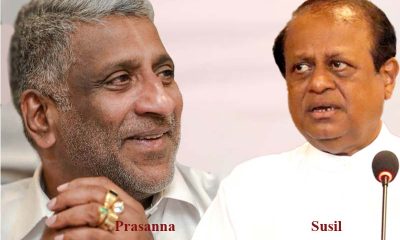Features
Dire Predictions, Karmic Quirks, Solheim’s Return and Ranilnomics

by Rajan Philips
The Sri Lankan political class has a ‘measurement problem’ with the economic crisis in the country. Political leaders and organizations, specifically the current parliament, seem to be lacking in competence to come to terms with the magnitude of the current economic problem. This failure manifests itself in the same-old-same-old ways in which parliament is conducting itself, and in the President’s facile optimism that although the crisis is grave, the country has in him the man who is capable of overcoming it. The assumption, or even the fact, that Ranil Wickremesinghe is the only one in parliament who has a measure of the problem does not by itself reduce the magnitude of the problem or renders its solution any easier.
The inability to grasp the magnitude of the problem invariably leads to superficial responses, both internally and externally. The optimism on the external front involves the assumption that all the external support mechanisms to overcome the economic crisis will eventually and somehow fall into place. It is only a matter of time. So, give some time and slack to the President. If only the realities were so simple! Cabinet ministers and a good majority of MPs seem to be taking it for granted that the IMF agreement, China’s concessions, the overall restructuring of debt payments, and the reopening of channels for new FDI inflows – all these will somehow start happening.
Dire Predictions
This level of optimism is contrary to the global reality which in every sense involves a highly divided, dog-eat-dog world in which it is already a struggle for Sri Lanka to get the attention and priority it desperately needs. That desperation is not sinking into the heads of cabinet ministers and MPs who are waiting to become ministers. Again, the assumption, or even the fact, that in President Wickremesinghe Sri Lanka has a leader who can reach out and get help from any country in the world does not necessarily mean that help is on the way, in double quick time, and in amounts that help is needed at any given time.
Add to this the dire predictions about a global economic downturn for 2023, and the specific warning in the IMF’s biannual World Economic Outlook released last Tuesday. that “the worst is yet to come, and for many people 2023 will feel like a recession.” Sri Lanka’s situation, by any measurement, is worse than a recession. And releasing the Outlook report, the IMF’s director of research, Pierre-Olivier Gourinchas offered this admonition about low-income countries: “Too many low-income countries are in or close to debt distress. Progress towards orderly debt restructurings through the Group of Twenty’s Common Framework for the most affected is urgently needed to avert a wave of sovereign debt crisis. Time may be soon running out.”
Sri Lanka is well past the point of aversion. Its debt restructuring talks are virtually stalled over the impasse involving the debt owed to China. This week Washington is hosting the annual meetings of the IMF and the World Bank attended by finance officials and central bankers from around the world. How is Sri Lanka going to be prioritized in this climate? State Minister of Finance Shehan Semasinghe is providing ministerial representation for Sri Lanka at the Washington meetings. This is the pathetic level at which Sri Lanka’s economic literacy is being exhibited at world gatherings of finance ministers and experts. Not to be outdone at home, the full Cabinet of Ministers reportedly decided to have Sri Lanka formally downgraded from middle-income status to low-income status. It was left to the much learned Minister Bandula Gunawardana to make the announcement on behalf of the cabinet, only to have it shot down almost immediately by the President’s Media Division. Perhaps one might feel sorry for the President in all this, but then again all of this including the cabinet is his own making.
Karmic Quirks
For his part, the President addressed parliament again on October. When I read the Sunday Island’s editorial last week on the President’s statement to parliament and its banner-coverage by the Daily News, I could not help chuckling how the wheels of political karma have turned over the last fifty years. That is a long time in politics by any measure, but here we have the Lake House papers that were nationalized by an SLFP-led government in 1973 to rebuke the Wijewardenas and the Wickremesinghes, now feting the grandson of DR Wijewardena and the son of Esmond Wickremesinghe, who is also Sri Lanka’s most fortuitous, but not quite fortunate, Head of State and Head of Government.
There was another karmic quirk that occurred recently, figuring Tiran Alles, who was the alleged mastermind behind the equally alleged arrangement between the LTTE and Mahinda Rajapaksa in the 2005 presidential election that led to the infamous fatwa that stopped Tamils in the North and East from voting and precipitated the defeat of Ranil Wickremesinghe by the narrowest of margins. That was then, and now Tiran Alles as Minister of Public Security is said to have misled President Wickremesinghe into signing the abominably extraordinary gazette on High Security Zones. The gazette has been withdrawn and the President’s supporters have blamed the Minister and the over-zealous Defense Secretary for the gazette misadventure. But that does not wholly absolve the President, for he should have known better without asking for the Attorney General’s opinion and he should be held responsible for appointing and/or retaining the current crop of Ministers and Ministry Secretaries.
All these nuggets would have been great for polemic grinding in ordinary times. But we are not in ordinary times, but extraordinary times. Politics itself is extraordinarily different, and the underlying living experiences of the people are extraordinarily difficult. But the government and the SLPP Ministers and MPs in parliament are not at sensitized to the people’s difficulties and the country’s challenges. They have abdicated their responsibilities to the President in return for the President protecting their interests.
In his statement to parliament, the President confessed to being repetitive and said, “I would like to draw your attention to some of the challenges we face today in reviving the collapsed economy” … and insisted that “we have got to consider it over and over again since it would enable us to comprehend the real picture of the situation we are in today.” However, the President did not present in any great detail – what he called “the real picture” of the country’s economy. And to the point of this article, the President’s address was full of words but there were no numbers – either about the severity of Sri Lanka’s debt problems, or about the timelines for their restructuring and repayments. Instead, he papered over the economic crimes of the Rajapaksas, and berated unnamed “groups” for apparently wanting to destroy the economy in order to capture political power.
The return of Solheim
Obviously, the President was having in mind the JVP whom he could not publicly scold after being with the JVP in the yahapalanaya government. His target group of course is the Frontline Socialist Party, which too the President chose not to name, perhaps out of deference to the JVP. Once again, the President reminded the country that he “embarked on this journey taking a huge risk … at a time when no other political party or leader of the opposition would accept this risk” … and requested all parliamentarians “to join a common program to build the country through the National Assembly of Parliament, “Jana Sabhava” which is to be established soon, and Parliamentary Sectoral Committees.”
The President has got himself into a habit of calling, at one moment, all MPs to join him, and then flying off the handle quite immediately and threatening to call a referendum unless parliament acts soon enough according to his timetable, which nobody knows. His latest referendum threat involves the Local Government elections. Few weeks earlier it was all about parliament coming to a consensus about enacting new election laws after sitting on them for nearly ten years. Now out of the blues comes the extraordinary announcement that the President has appointed former Norwegian Minister Erik Solheim as his “International Climate Adviser.”
It is not quite out of the blues when you hear from Mr. Solheim himself, how this appointment came about. According to his email exchange with the Daily Mirror, “My old friend Ranil Wickremesinghe invited me to visit Sri Lanka and asked me to be his International Climate Adviser. I am looking forward to working closely with the President and his great team on how to assist Sri Lanka to find a green pathway out of the economic crisis. Renewable energy, electric mobility, tree planting, green agriculture and ecotourism all offer huge opportunities for jobs and prosperity while taking good care of Mother Earth at the same time.” Is this another turn of the wheel of karma?
Not surprisingly, Mr. Solheim has called “the proposal for a university on climate science in Sri Lanka a brilliant idea,” and noted that “Sri Lanka has a very rich intellectual tradition and can establish a hub for climate science – working closely with other Indian Ocean nations and the rest of the world.” What can you say, except ask, what are friends for? Even when your country is struggling to feed its children. Why did not the President think of appointing Mr. Solheim as his international adviser to prevent malnutrition among Sri Lanka’s children? That would have been a little less indefensible.
Ranilnomics
Through all these distractions, Mr. Wickremesinghe’s ultimate reason for being President is his assumed ability to lead Sri Lanka’s economic recovery. In his many statements since “embarking on this journey taking a huge risk,” first as crisis Prime Minister and now as redeemer President, Ranil Wickremesinghe has been outlining his approach to overcoming Sri Lanka’s economic problems. Dr. W.A Wijewardena, a former Deputy Governor of the Central Bank and a frequent writer of expert articles on practical economics, has described Mr. Wickremesinghe’s approach in summary as “Ranilnomics.”
Ranilnomics is the Wickremesinghe version of “social market economy policy” that was first tried in postwar Germany. As described by Dr. Wijewardena, it was “an attempt at finding a middle path between pure capitalism and extreme socialism.” Mr. Wickremesinghe has been elaborating on this for some time – first as half-powerful Prime Minister in the yahapalana government and now as all-powerful president in a post-Rajapaksa government. Given Mr. Wickremesinghe’s somewhat long association with ‘social market economy’ (SME) and predating the current economic crisis, the SME approach is not an automatic toolbox with all or most of the tools that might be appropriate for use in the current situation.
In fact, there is no such ready made toolbox, but there are enough economists in Sri Lanka who would be able to provide consistent advice to the government. The President has occasionally referred to experts offering voluntary advice and support to him and to the government. If so, why is it that their involvement is not made public or channeled through formal institutional arrangements? Ever since public protests broke out against the Rajapaksa regime, expectations arose that outside experts would be brought into parliament and cabinet through the National List avenue. The JVP and some of the opposition parties were prepared to sacrifice their MPs to create openings for outside experts to enter parliament and then the cabinet. Of course, that would be anathema to SLPP MPs.
But why has not the President done anything to bring in outside experts as MPs and make them ministers? Instead, there is Shehan Semasinghe, State of Minister of Finance, doing the honours for Sri Lanka at the IMF and the World Bank in Washington. There is Bandula Gunawardene always talking out of turn in Colombo, and the whole cabinet seriously deciding to formally downgrade Sri Lanka from middle-income status to low income status. In all the reporting of interventions by other countries and international agencies, there seems to be an emerging focus on helping vulnerable sections meeting their basic needs and helping children avoid malnutrition.
There might be financial and material support to prevent severe food shortages and malnutrition, but no easy way out for the government to get an IMF agreement on track and to reach agreement on a debt restructuring package. That would be just rewards for a government that in spite of having a new President has learnt nothing and forgotten everything from the exit passage of the Rajapaksa family. Unfortunately, the people will have to suffer collateral damages but they will have their turn, hopefully sooner than later, to vote the present rascals out and elect a new parliament that will have credibility both within and outside the country.
Features
The heart-friendly health minister

by Dr Gotabhya Ranasinghe
Senior Consultant Cardiologist
National Hospital Sri Lanka
When we sought a meeting with Hon Dr. Ramesh Pathirana, Minister of Health, he graciously cleared his busy schedule to accommodate us. Renowned for his attentive listening and deep understanding, Minister Pathirana is dedicated to advancing the health sector. His openness and transparency exemplify the qualities of an exemplary politician and minister.
Dr. Palitha Mahipala, the current Health Secretary, demonstrates both commendable enthusiasm and unwavering support. This combination of attributes makes him a highly compatible colleague for the esteemed Minister of Health.
Our discussion centered on a project that has been in the works for the past 30 years, one that no other minister had managed to advance.
Minister Pathirana, however, recognized the project’s significance and its potential to revolutionize care for heart patients.
The project involves the construction of a state-of-the-art facility at the premises of the National Hospital Colombo. The project’s location within the premises of the National Hospital underscores its importance and relevance to the healthcare infrastructure of the nation.
This facility will include a cardiology building and a tertiary care center, equipped with the latest technology to handle and treat all types of heart-related conditions and surgeries.
Securing funding was a major milestone for this initiative. Minister Pathirana successfully obtained approval for a $40 billion loan from the Asian Development Bank. With the funding in place, the foundation stone is scheduled to be laid in September this year, and construction will begin in January 2025.
This project guarantees a consistent and uninterrupted supply of stents and related medications for heart patients. As a result, patients will have timely access to essential medical supplies during their treatment and recovery. By securing these critical resources, the project aims to enhance patient outcomes, minimize treatment delays, and maintain the highest standards of cardiac care.
Upon its fruition, this monumental building will serve as a beacon of hope and healing, symbolizing the unwavering dedication to improving patient outcomes and fostering a healthier society.We anticipate a future marked by significant progress and positive outcomes in Sri Lanka’s cardiovascular treatment landscape within the foreseeable timeframe.
Features
A LOVING TRIBUTE TO JESUIT FR. ALOYSIUS PIERIS ON HIS 90th BIRTHDAY

by Fr. Emmanuel Fernando, OMI
Jesuit Fr. Aloysius Pieris (affectionately called Fr. Aloy) celebrated his 90th birthday on April 9, 2024 and I, as the editor of our Oblate Journal, THE MISSIONARY OBLATE had gone to press by that time. Immediately I decided to publish an article, appreciating the untiring selfless services he continues to offer for inter-Faith dialogue, the renewal of the Catholic Church, his concern for the poor and the suffering Sri Lankan masses and to me, the present writer.
It was in 1988, when I was appointed Director of the Oblate Scholastics at Ampitiya by the then Oblate Provincial Fr. Anselm Silva, that I came to know Fr. Aloy more closely. Knowing well his expertise in matters spiritual, theological, Indological and pastoral, and with the collaborative spirit of my companion-formators, our Oblate Scholastics were sent to Tulana, the Research and Encounter Centre, Kelaniya, of which he is the Founder-Director, for ‘exposure-programmes’ on matters spiritual, biblical, theological and pastoral. Some of these dimensions according to my view and that of my companion-formators, were not available at the National Seminary, Ampitiya.
Ever since that time, our Oblate formators/ accompaniers at the Oblate Scholasticate, Ampitiya , have continued to send our Oblate Scholastics to Tulana Centre for deepening their insights and convictions regarding matters needed to serve the people in today’s context. Fr. Aloy also had tried very enthusiastically with the Oblate team headed by Frs. Oswald Firth and Clement Waidyasekara to begin a Theologate, directed by the Religious Congregations in Sri Lanka, for the contextual formation/ accompaniment of their members. It should very well be a desired goal of the Leaders / Provincials of the Religious Congregations.
Besides being a formator/accompanier at the Oblate Scholasticate, I was entrusted also with the task of editing and publishing our Oblate journal, ‘The Missionary Oblate’. To maintain the quality of the journal I continue to depend on Fr. Aloy for his thought-provoking and stimulating articles on Biblical Spirituality, Biblical Theology and Ecclesiology. I am very grateful to him for his generous assistance. Of late, his writings on renewal of the Church, initiated by Pope St. John XX111 and continued by Pope Francis through the Synodal path, published in our Oblate journal, enable our readers to focus their attention also on the needed renewal in the Catholic Church in Sri Lanka. Fr. Aloy appreciated very much the Synodal path adopted by the Jesuit Pope Francis for the renewal of the Church, rooted very much on prayerful discernment. In my Religious and presbyteral life, Fr.Aloy continues to be my spiritual animator / guide and ongoing formator / acccompanier.
Fr. Aloysius Pieris, BA Hons (Lond), LPh (SHC, India), STL (PFT, Naples), PhD (SLU/VC), ThD (Tilburg), D.Ltt (KU), has been one of the eminent Asian theologians well recognized internationally and one who has lectured and held visiting chairs in many universities both in the West and in the East. Many members of Religious Congregations from Asian countries have benefited from his lectures and guidance in the East Asian Pastoral Institute (EAPI) in Manila, Philippines. He had been a Theologian consulted by the Federation of Asian Bishops’ Conferences for many years. During his professorship at the Gregorian University in Rome, he was called to be a member of a special group of advisers on other religions consulted by Pope Paul VI.
Fr. Aloy is the author of more than 30 books and well over 500 Research Papers. Some of his books and articles have been translated and published in several countries. Among those books, one can find the following: 1) The Genesis of an Asian Theology of Liberation (An Autobiographical Excursus on the Art of Theologising in Asia, 2) An Asian Theology of Liberation, 3) Providential Timeliness of Vatican 11 (a long-overdue halt to a scandalous millennium, 4) Give Vatican 11 a chance, 5) Leadership in the Church, 6) Relishing our faith in working for justice (Themes for study and discussion), 7) A Message meant mainly, not exclusively for Jesuits (Background information necessary for helping Francis renew the Church), 8) Lent in Lanka (Reflections and Resolutions, 9) Love meets wisdom (A Christian Experience of Buddhism, 10) Fire and Water 11) God’s Reign for God’s poor, 12) Our Unhiddden Agenda (How we Jesuits work, pray and form our men). He is also the Editor of two journals, Vagdevi, Journal of Religious Reflection and Dialogue, New Series.
Fr. Aloy has a BA in Pali and Sanskrit from the University of London and a Ph.D in Buddhist Philosophy from the University of Sri Lankan, Vidyodaya Campus. On Nov. 23, 2019, he was awarded the prestigious honorary Doctorate of Literature (D.Litt) by the Chancellor of the University of Kelaniya, the Most Venerable Welamitiyawe Dharmakirthi Sri Kusala Dhamma Thera.
Fr. Aloy continues to be a promoter of Gospel values and virtues. Justice as a constitutive dimension of love and social concern for the downtrodden masses are very much noted in his life and work. He had very much appreciated the commitment of the late Fr. Joseph (Joe) Fernando, the National Director of the Social and Economic Centre (SEDEC) for the poor.
In Sri Lanka, a few religious Congregations – the Good Shepherd Sisters, the Christian Brothers, the Marist Brothers and the Oblates – have invited him to animate their members especially during their Provincial Congresses, Chapters and International Conferences. The mainline Christian Churches also have sought his advice and followed his seminars. I, for one, regret very much, that the Sri Lankan authorities of the Catholic Church –today’s Hierarchy—- have not sought Fr.
Aloy’s expertise for the renewal of the Catholic Church in Sri Lanka and thus have not benefited from the immense store of wisdom and insight that he can offer to our local Church while the Sri Lankan bishops who governed the Catholic church in the immediate aftermath of the Second Vatican Council (Edmund Fernando OMI, Anthony de Saram, Leo Nanayakkara OSB, Frank Marcus Fernando, Paul Perera,) visited him and consulted him on many matters. Among the Tamil Bishops, Bishop Rayappu Joseph was keeping close contact with him and Bishop J. Deogupillai hosted him and his team visiting him after the horrible Black July massacre of Tamils.
Features
A fairy tale, success or debacle

Sri Lanka-Singapore Free Trade Agreement
By Gomi Senadhira
senadhiragomi@gmail.com
“You might tell fairy tales, but the progress of a country cannot be achieved through such narratives. A country cannot be developed by making false promises. The country moved backward because of the electoral promises made by political parties throughout time. We have witnessed that the ultimate result of this is the country becoming bankrupt. Unfortunately, many segments of the population have not come to realize this yet.” – President Ranil Wickremesinghe, 2024 Budget speech
Any Sri Lankan would agree with the above words of President Wickremesinghe on the false promises our politicians and officials make and the fairy tales they narrate which bankrupted this country. So, to understand this, let’s look at one such fairy tale with lots of false promises; Ranil Wickremesinghe’s greatest achievement in the area of international trade and investment promotion during the Yahapalana period, Sri Lanka-Singapore Free Trade Agreement (SLSFTA).
It is appropriate and timely to do it now as Finance Minister Wickremesinghe has just presented to parliament a bill on the National Policy on Economic Transformation which includes the establishment of an Office for International Trade and the Sri Lanka Institute of Economics and International Trade.
Was SLSFTA a “Cleverly negotiated Free Trade Agreement” as stated by the (former) Minister of Development Strategies and International Trade Malik Samarawickrama during the Parliamentary Debate on the SLSFTA in July 2018, or a colossal blunder covered up with lies, false promises, and fairy tales? After SLSFTA was signed there were a number of fairy tales published on this agreement by the Ministry of Development Strategies and International, Institute of Policy Studies, and others.
However, for this article, I would like to limit my comments to the speech by Minister Samarawickrama during the Parliamentary Debate, and the two most important areas in the agreement which were covered up with lies, fairy tales, and false promises, namely: revenue loss for Sri Lanka and Investment from Singapore. On the other important area, “Waste products dumping” I do not want to comment here as I have written extensively on the issue.
1. The revenue loss
During the Parliamentary Debate in July 2018, Minister Samarawickrama stated “…. let me reiterate that this FTA with Singapore has been very cleverly negotiated by us…. The liberalisation programme under this FTA has been carefully designed to have the least impact on domestic industry and revenue collection. We have included all revenue sensitive items in the negative list of items which will not be subject to removal of tariff. Therefore, 97.8% revenue from Customs duty is protected. Our tariff liberalisation will take place over a period of 12-15 years! In fact, the revenue earned through tariffs on goods imported from Singapore last year was Rs. 35 billion.
The revenue loss for over the next 15 years due to the FTA is only Rs. 733 million– which when annualised, on average, is just Rs. 51 million. That is just 0.14% per year! So anyone who claims the Singapore FTA causes revenue loss to the Government cannot do basic arithmetic! Mr. Speaker, in conclusion, I call on my fellow members of this House – don’t mislead the public with baseless criticism that is not grounded in facts. Don’t look at petty politics and use these issues for your own political survival.”
I was surprised to read the minister’s speech because an article published in January 2018 in “The Straits Times“, based on information released by the Singaporean Negotiators stated, “…. With the FTA, tariff savings for Singapore exports are estimated to hit $10 million annually“.
As the annual tariff savings (that is the revenue loss for Sri Lanka) calculated by the Singaporean Negotiators, Singaporean $ 10 million (Sri Lankan rupees 1,200 million in 2018) was way above the rupees’ 733 million revenue loss for 15 years estimated by the Sri Lankan negotiators, it was clear to any observer that one of the parties to the agreement had not done the basic arithmetic!
Six years later, according to a report published by “The Morning” newspaper, speaking at the Committee on Public Finance (COPF) on 7th May 2024, Mr Samarawickrama’s chief trade negotiator K.J. Weerasinghehad had admitted “…. that forecasted revenue loss for the Government of Sri Lanka through the Singapore FTA is Rs. 450 million in 2023 and Rs. 1.3 billion in 2024.”
If these numbers are correct, as tariff liberalisation under the SLSFTA has just started, we will pass Rs 2 billion very soon. Then, the question is how Sri Lanka’s trade negotiators made such a colossal blunder. Didn’t they do their basic arithmetic? If they didn’t know how to do basic arithmetic they should have at least done their basic readings. For example, the headline of the article published in The Straits Times in January 2018 was “Singapore, Sri Lanka sign FTA, annual savings of $10m expected”.
Anyway, as Sri Lanka’s chief negotiator reiterated at the COPF meeting that “…. since 99% of the tariffs in Singapore have zero rates of duty, Sri Lanka has agreed on 80% tariff liberalisation over a period of 15 years while expecting Singapore investments to address the imbalance in trade,” let’s turn towards investment.
Investment from Singapore
In July 2018, speaking during the Parliamentary Debate on the FTA this is what Minister Malik Samarawickrama stated on investment from Singapore, “Already, thanks to this FTA, in just the past two-and-a-half months since the agreement came into effect we have received a proposal from Singapore for investment amounting to $ 14.8 billion in an oil refinery for export of petroleum products. In addition, we have proposals for a steel manufacturing plant for exports ($ 1 billion investment), flour milling plant ($ 50 million), sugar refinery ($ 200 million). This adds up to more than $ 16.05 billion in the pipeline on these projects alone.
And all of these projects will create thousands of more jobs for our people. In principle approval has already been granted by the BOI and the investors are awaiting the release of land the environmental approvals to commence the project.
I request the Opposition and those with vested interests to change their narrow-minded thinking and join us to develop our country. We must always look at what is best for the whole community, not just the few who may oppose. We owe it to our people to courageously take decisions that will change their lives for the better.”
According to the media report I quoted earlier, speaking at the Committee on Public Finance (COPF) Chief Negotiator Weerasinghe has admitted that Sri Lanka was not happy with overall Singapore investments that have come in the past few years in return for the trade liberalisation under the Singapore-Sri Lanka Free Trade Agreement. He has added that between 2021 and 2023 the total investment from Singapore had been around $162 million!
What happened to those projects worth $16 billion negotiated, thanks to the SLSFTA, in just the two-and-a-half months after the agreement came into effect and approved by the BOI? I do not know about the steel manufacturing plant for exports ($ 1 billion investment), flour milling plant ($ 50 million) and sugar refinery ($ 200 million).
However, story of the multibillion-dollar investment in the Petroleum Refinery unfolded in a manner that would qualify it as the best fairy tale with false promises presented by our politicians and the officials, prior to 2019 elections.
Though many Sri Lankans got to know, through the media which repeatedly highlighted a plethora of issues surrounding the project and the questionable credentials of the Singaporean investor, the construction work on the Mirrijiwela Oil Refinery along with the cement factory began on the24th of March 2019 with a bang and Minister Ranil Wickremesinghe and his ministers along with the foreign and local dignitaries laid the foundation stones.
That was few months before the 2019 Presidential elections. Inaugurating the construction work Prime Minister Ranil Wickremesinghe said the projects will create thousands of job opportunities in the area and surrounding districts.
The oil refinery, which was to be built over 200 acres of land, with the capacity to refine 200,000 barrels of crude oil per day, was to generate US$7 billion of exports and create 1,500 direct and 3,000 indirect jobs. The construction of the refinery was to be completed in 44 months. Four years later, in August 2023 the Cabinet of Ministers approved the proposal presented by President Ranil Wickremesinghe to cancel the agreement with the investors of the refinery as the project has not been implemented! Can they explain to the country how much money was wasted to produce that fairy tale?
It is obvious that the President, ministers, and officials had made huge blunders and had deliberately misled the public and the parliament on the revenue loss and potential investment from SLSFTA with fairy tales and false promises.
As the president himself said, a country cannot be developed by making false promises or with fairy tales and these false promises and fairy tales had bankrupted the country. “Unfortunately, many segments of the population have not come to realize this yet”.
(The writer, a specialist and an activist on trade and development issues . )


